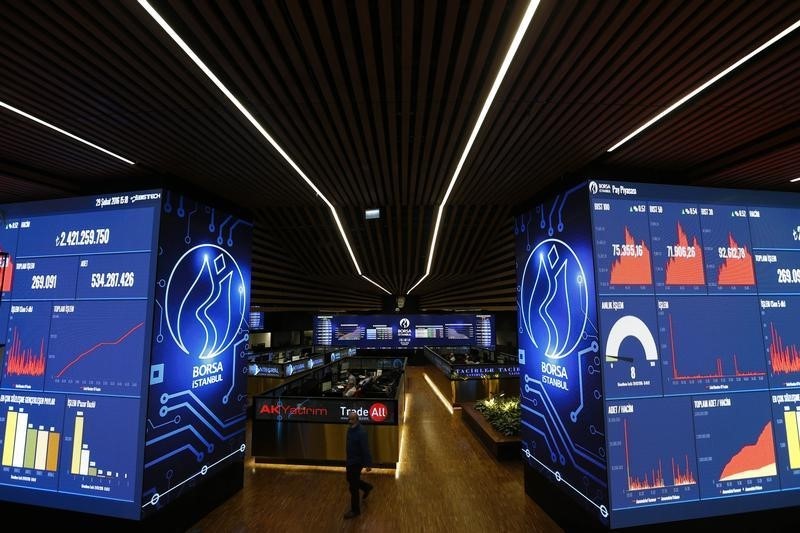By David Dolan and Seda Sezer
ISTANBUL (Reuters) - Turkish stocks fell 1.3 percent on Friday, on track for their worst weekly performance in nearly five years, hit by renewed political uncertainty after Prime Minister Ahmet Davutoglu said he would step down.
Davutoglu said on Thursday he would step aside later this month as leader of the ruling AK Party, and therefore as premier, following weeks of rising public tension with President Tayyip Erdogan.
News of his departure has prompted concern among investors, who fear Erdogan will take greater control over the management of the economy, potentially hampering reform and putting more pressure on the central bank for rate cuts.
"Turkey has entered a period of rising political risk again, at least for the next 6-8 months," Ercan Erguzel, an economist at Morgan Stanley (NYSE:MS), said in a note.
The BIST 100 index (XU100), the broadest measure of Istanbul stock performance, was down 1.3 percent at 77,682 at 1136 GMT, putting it on track for a nearly 9 percent fall this week, its biggest one-week drop since August 2011.
Like Deputy Prime Minister Mehmet Simsek, who is in charge of the economy, Davutoglu is seen as sticking to an orthodox economic stance, as opposed to Erdogan, who has said that high interest rates lead to inflation, an argument at odds with mainstream economics.
"Key short-term signals will be whether Simsek and the 'reformers' manage to survive and 'ring fence' their positions with the change of prime minister," said Timothy Ash, a strategist at Nomura International, in emailed comments.
Any slow-down in reform would be bad for long-term growth and development, he added.
SIMSEK WARNING
That sentiment was echoed by Simsek in a speech in Istanbul on Friday.
"If reforms are partial or if they do not progress at all, this will of course affect growth negatively," he said, adding Turkey would not be able to achieve 5 percent annual economic growth on the basis of its "current efforts".
Turkey needs more foreign investment to plug a yawning current account deficit of around 4.5 percent of GDP and finance its heavily indebted companies, economists say. Investors want to see reforms to boost the savings rate and liberalize the labor market.
Under the AK Party, which was co-founded by Erdogan and came to power in 2002, Turkey has enjoyed years of stellar growth, going from an economic backwater at the edge of Europe to an advanced emerging market and one of the world's 20 largest economies.
But its star has fallen dramatically in recent years, hurt by slowing growth, rising debt and fears about both violence in the mainly Kurdish southeast and Erdogan's authoritarian streak.
In dollar terms, the BIST 30 index of blue chips (XU030) has grown more than four-fold since the end of 2002, just after the AKP first came to power, although that still underperformed other emerging markets such as Mexico, Brazil and India, according to Thomson Reuters data.
Recent performance has been less impressive. Over the last five years, the blue-chip index has lost 40 percent of its value in dollar terms, the sixth-worst performance among 30 emerging market stock indices, according to Thomson Reuters data.
This year, major blue chip decliners include tourism-related companies such as national carrier Turkish Airlines (IS:THYAO), which have been hit by a drop-off in tourist arrivals after a spate of bomb attacks this year.
